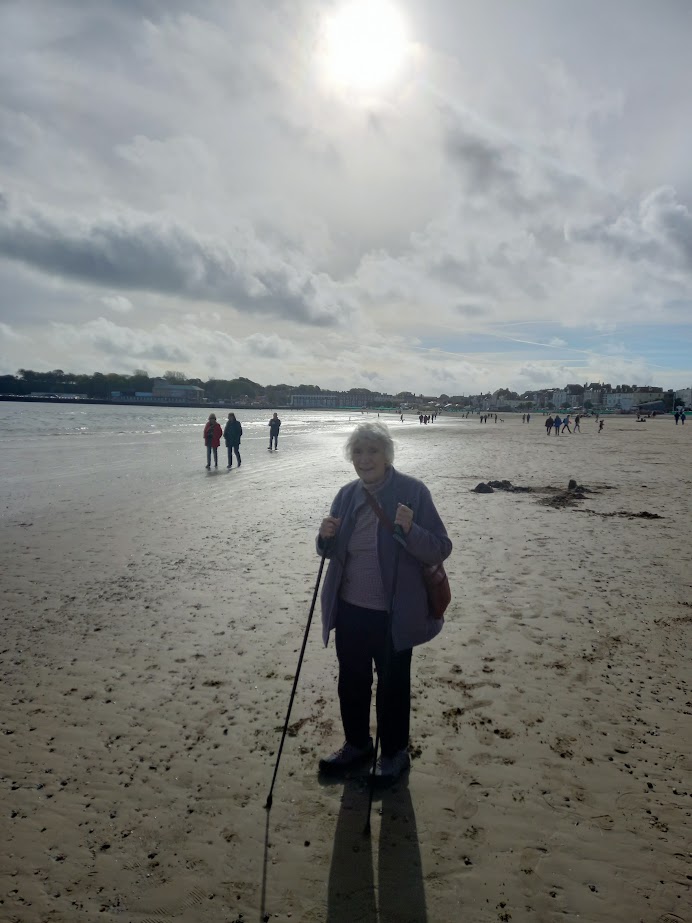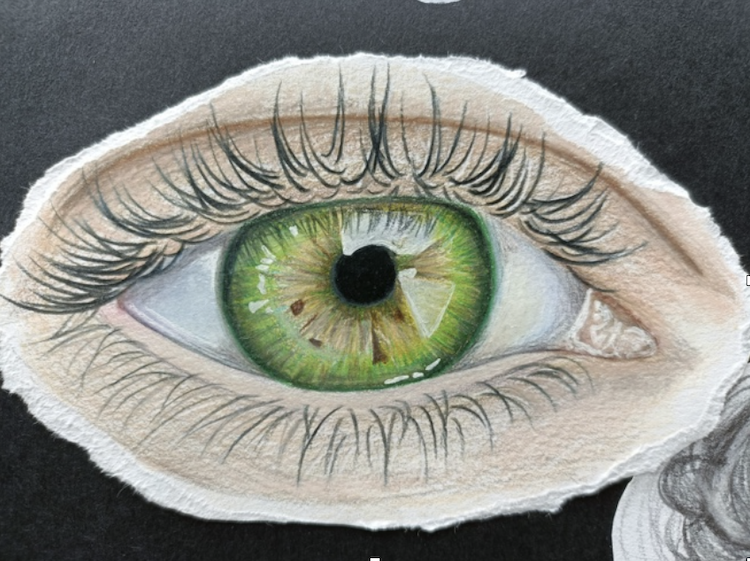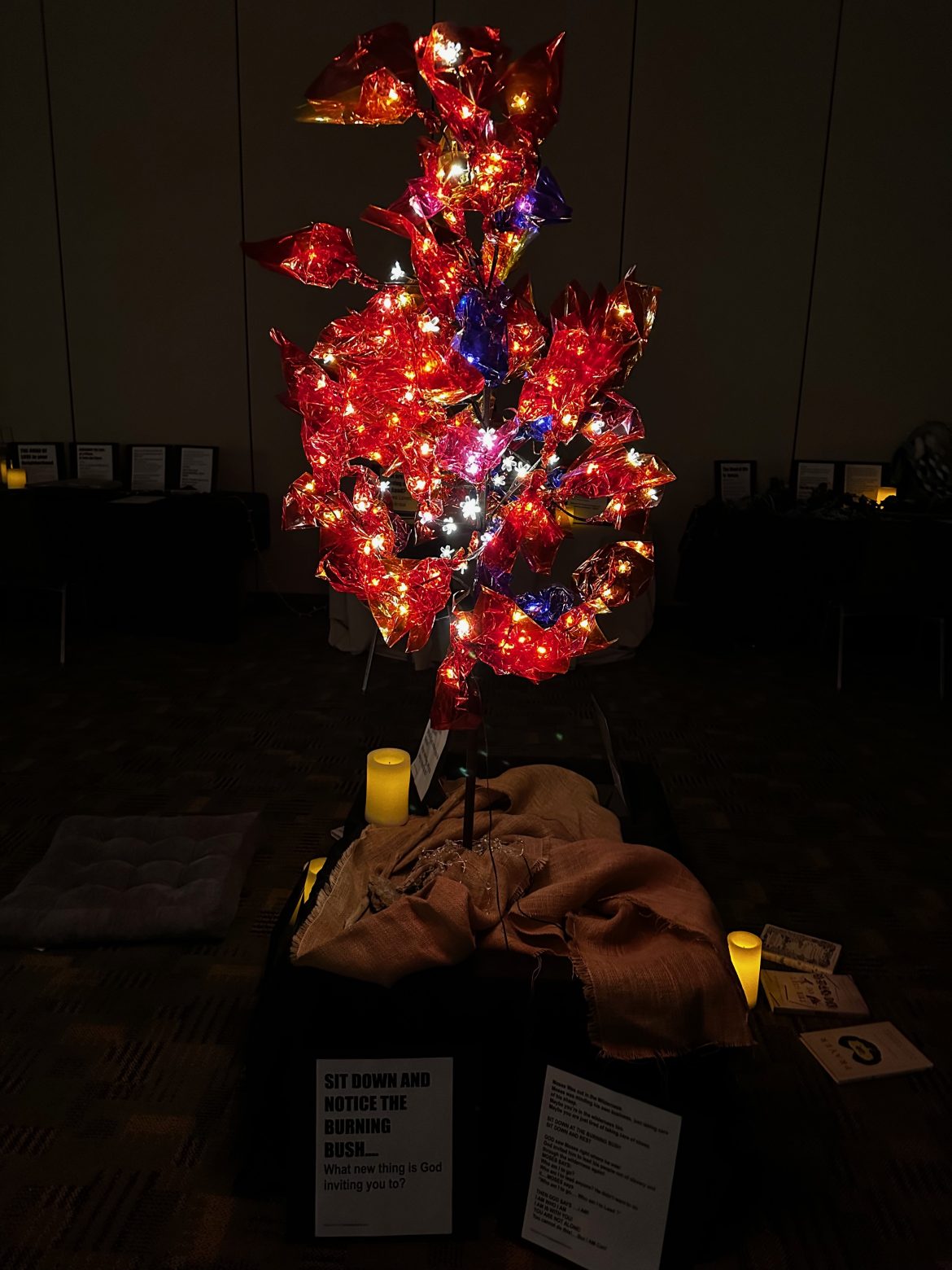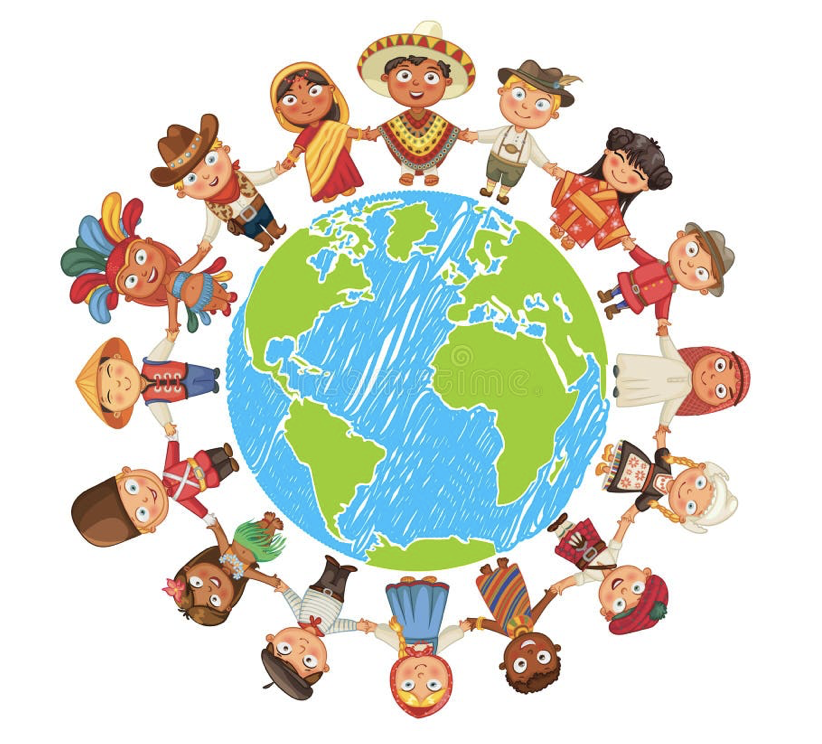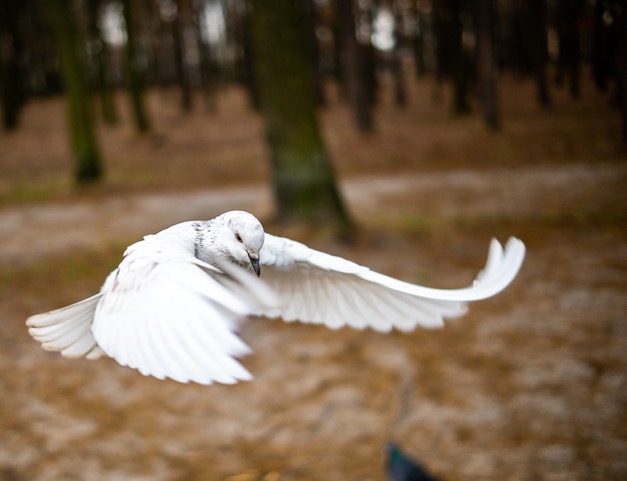[Photograph is of my friend, Tessa, who loved life. This was taken by myself 3 months before she died. The UK November weather decided to be unseasonally sunny so she could enjoy her last trip to the seaside]
In the UK we love a good moan about “seasons”. We bemoan the summer when it gets too hot, too wet, too windy, too cold. We bemoan the winter when it doesn’t get enough snow, too much snow, rain, wind. You get the picture. We Brits love a good natter about the weather and how it isn’t doing what it’s meant to be doing for the time of year. I think the only time there was joy rather than whinging was the spring of 2020 when we went into lockdown and the weather was warm and dry so we were able to get out in our gardens, go for the allotted walks we had permission to do, and in rural areas maybe extend those walks.
I wonder too if we moan about “seasonal spirituality” – as in Christmas is too busy and comes round too soon, the “Church” doesn’t do Easter like it used to, in X denomination they don’t do X-season as well as Y church that we don’t attended because …..
But what does seasonal spirituality really mean? Or at least what does it mean to me?
At the moment I’m not regularly attending a congregation and my husband has had to accept that this is the season I am in. But I do co-run a Christian youth group; although that has not taken place since May due to the majority of our young people being busy. We only have 5 young people so if 3 of them are busy and others don’t want to come because their friends aren’t coming then it doesn’t happen. Myself and my co-leader have to accept this is the season our group is in.
For me seasonal spirituality means not just going with the seasons of the land – spring, summer, autumn, winter – but going with the seasons of my heart, of what I believe God is saying to me, of what I have the energy to do. It is trusting that inner voice, checking that it isn’t just me being obtuse [as in with the not going to church] or people pleasing [as in with the going to church/getting involved with church based activities], and checking in with God to really know what God wants of me in this season of my life.
Talking of seasons, I am now in my early 60s and so I look at life differently to what I did in my early 40s even, and definitely differently to how I looked at life in my early 20s. I need to explore this new season of my life not just rush boldly forward doing whatever. And I think that is the same with spirituality – we often don’t pause, take time out to feel that change of season, but rush forward either doing the same old same old or often getting busier and busier.
Life changed in 2020. There were a lot of prophecies about “perfect vision” and I still believe lockdown, Brexit here in the UK, mass migrations, climate change, the war in Ukraine, and other things are part of the reviewing of the world. And I think we need to pause, to look, to really see what God is really seeing.
Jesus talks about “those who have ears let them hear” and about people being “always seeing but never perceiving” and yet if we don’t take time out to see what the spirituality season is that we are in then we will not hear God’s voice, will not see what God is doing, will not perceive our role in this.
So are we willing to take some time to contemplate what season we are in? To not grumble that it is too busy/quiet/fast/slow/wet/dry/revival/not/etc? And will we just wait until we can really hear what God is doing, really perceive what God is doing and really know our part in all of this. And maybe it is as Christine said the other day our work is loving the world just as it is. How about giving that a god for a while?
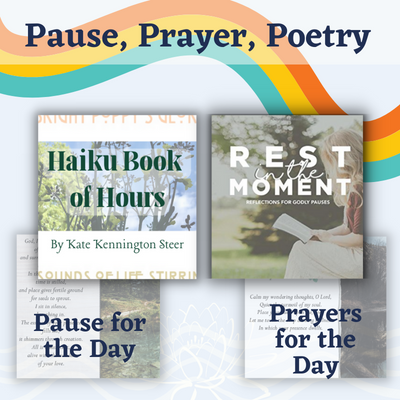 Whether you are praying the stations of the day, in need of resources for rest, hoping to spark joy and find wonder, or simply want to enjoy beautiful prayers, poetry, and art – our digital downloads section has many options! Christine Sine’s book Rest in the Moment is designed to help you find those pauses throughout the day. Praying through the hours or watches, you may find inspiration in our prayer cards set Prayers for the Day or Pause for the Day. You may find your curiosity piqued in the free poetry and art download Haiku Book of Hours. All this and more can be found in our shop!
Whether you are praying the stations of the day, in need of resources for rest, hoping to spark joy and find wonder, or simply want to enjoy beautiful prayers, poetry, and art – our digital downloads section has many options! Christine Sine’s book Rest in the Moment is designed to help you find those pauses throughout the day. Praying through the hours or watches, you may find inspiration in our prayer cards set Prayers for the Day or Pause for the Day. You may find your curiosity piqued in the free poetry and art download Haiku Book of Hours. All this and more can be found in our shop!
This morning I wandered around our garden in the rain, inhaling the wonderful aroma of petrichor in the air. You may remember that last week I talked about my spiritual practice of walking around the garden early in the morning watering my plants and Vigen Guroian’s comment that this was a little like baptism. Well this morning as I walked around in the rain, it was like baptism and anointing with oil all melded into one. This was our first rain for a couple of months and the sense of renewal and refreshment was incredible. I almost felt I could hear the plants singing and rejoicing. Walking in the rain is a fun spiritual practice, that I normally indulge in in winter when rain is far more frequent in the Pacific NW. However this year’s exceptionally dry summer has made me realize once again, what an incredible gift rain can be and that we should not take it for granted.
I find more and more that paying attention to the Godspace posts gives important insights and guidance for the week. National Ice Cream Day was followed by our neighbourhood ice cream summer social, a fun gathering of neighbours and neighbourhood businesses to get to know each other and appreciate our neighbourhood. Carol Dixon’s International Friendship Day post had me giving thanks for friends at home and across the world. I even sent out a few appreciation notes and received a few in return.
Laurie Klein in her post on St Mildred’s Day introduced most of us to a new and very interesting Celtic saint who was a paragon of gentleness, generous compassion, and serenity, St. Mildred was an advocate for widows and orphans, troubled people and social pariahs.
Lilly Lewin continues to inspire me with her prayer station ideas. Like her I have been reading the First Nation’s Version of the New Testament and loved that in her Freerange Friday: Joining Jesus on the Road of Love, that she drew creatively from this and especially its translation of I Cor 13 “Love keeps walking even when carrying a heavy load.
Love keeps trusting, never loses hope, and stands firm in hard times. The road of love has no end. “ Like Lilly, I appreciate the rich array of Biblical translations that are now available and the ways that different perspectives of the Biblical text broadens our understanding of the story. And Lilly Lewin’s creative use makes it even richer.
Sheila Hamil also uses scripture creatively in her post The Parable of the Light As she says “if we make a conscious effort to set a guard on our eyes, and take in what St Paul recommends in his letter to the Philippians, we will have light for our souls and God’s peace in our heart. “ A very informative article.
My own Meditation Monday: Kintsugi – The Art of Mending Broken Pieces this week is on the Japanese practice of Kintsugi, which I practiced, over the weekend. My attempts were not very successful but I certainly learned a lot as I used the practice to reflect on the broken places of my life and the ways that God is slowly making me whole. As I said: None of us are without flaws yet God is able to mend and make all of us whole. And when God mends it is like pure gold has been added to our lives. There is beauty hidden in the brokenness all of us struggle with. God does not discard us because we are broken. Our remade selves are grounded in the transformation of our brokenness.
As I mentioned last week I am preparing for three virtual retreats in the coming season so make sure you have these on your calendars, the event pages should be live next week. September 2nd – Rhythms and Seasons, October 14th – Living in Gratitude, and December 9th – Advent Quiet Day Retreat. I hope you can join me for this series. Each will be a stand alone retreat but the series together, I think will enrich our lives, nourish us through the rest of the year and prepare us for a busy new year coming.
A prayer request and call for help too as I end this newsletter. Some of you may remember that I planned to launch my podcast The Liturgical Rebel in September. I am not sure that will happen as I need technical and graphic design help to set it up. I expected to have an intern over the summer who wanted to work with me on this, but her internship application was denied. If you would like to help me launch this exciting new venture, or if you know someone who might like to help please let me know.
My stargazer lilies are flowering at the moment so I thought I would end with yet another beautiful Mary Oliver poem.
Mary Oliver – “Lilies” from House of Light
I have been thinking
about living
like the lilies
that blow in the fields.
They rise and fall
in the edge of the wind,
and have no shelter
from the tongues of the cattle,
and have no closets or cupboards,
and have no legs.
Still I would like to be
as wonderful
as the old idea.
But if I were a lily
I think I would wait all day
for the green face
of the hummingbird
to touch me.
What I mean is,
could I forget myself
even in those feathery fields?
When Van Gogh
preached to the poor
of course he wanted to save someone–
most of all himself.
He wasn’t a lily,
and wandering through the bright fields
only gave him more ideas
it would take his life to solve.
I think I will always be lonely
in this world, where the cattle
graze like a black and white river–
where the vanishing lilies
melt, without protest, on their tongues–
where the hummingbird, whenever there is a fuss,
just rises and floats away.
Many blessings
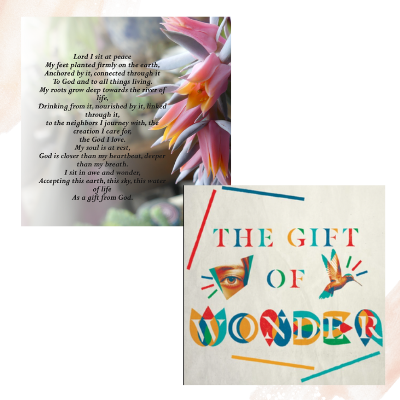
Gift of Wonder bundle
Gift of Wonder Bundle
Book + Prayer Cards
Purchase a copy of Christine’s book Gift of Wonder and we will include a set of the prayer cards made to accompany it. These cards are designed to enrich your book study and practice. Prayers from the book are illustrated with images to assist your contemplation. The back of each card provides a short excerpt with a question for you to reflect on.
by Christine Sine
A couple of weeks ago I broke my favourite mug. When I posted a photo of its sad state on Facebook, several people suggested I try mending it by using the Japanese art of Kintsugi, the 15th-Century practice meaning “to join with gold”. I discovered Kintsugi, the art of mending broken pottery with lacquer resin sprinkled with powdered gold, or silver or platinum, several years ago, long before I started to experiment with creative ways to express my spirituality, but never tried it, probably because it seemed too messy and I was afraid of ending up with a new object that was far from perfect.

Broken mug
I knew that my mug has too many broken pieces for a beginner like me so I decided to start with this broken flower pot, which only had one break, instead. After all how hard could it be to mend a single break like this?

Broken Flowerpot
Well as you can imagine it was much harder than I expected, and the resulting pot and its mend looks very messy. I think I added too much hardener to the resin. Nothing like the beautiful teapot in the photo at the top of the article. However, it was fun and quite therapeutic and definitely made me feel I wanted to give it another go, maybe with something smaller until I get the technique figured out. After all, mending the broken pieces of our lives is often very messy too and usually takes more than one attempt. Even then it is just as likely to end up with messy results as it is with beautiful ones.

Mended flowerpot
Knowing that imperfect objects can be remade into something more beautiful than the original gives me hope that that the imperfections in my life can be mended to make me into a more beautiful vessel than I was before. “Whether you’re going through the loss of a loved one or a job, or are recovering from an injury, divorce or other personal tragedy, Kintsugi can be a way to reframe hardships to remind yourself that you’re not a victim of your circumstances — and to help you come out the other side stronger.” says Candice Kumai in her book Kintsugi Wellness: The Japanese art of Nourishing Mind, Body and Spirit
None of us are without flaws yet God is able to mend and make all of us whole. And when God mends it is like pure gold has been added to our lives. There is beauty hidden in the brokenness all of us struggle with. God does not discard us because we are broken. Our remade selves are grounded in the transformation of our brokenness.
What is your response?
Watch the video below about the art of Kintsugi. What comes to your mind as you listen to this craftsman talk about his art? What areas in your life have already been mended with gold? What is the new beauty that has been formed in the mending? Write these down and spend time thanking God not just for the mending but for the brokenness that made possible new areas of beauty in your life.
Now read Colossians 1:15-20 from The Message
We look at this Son and see the God who cannot be seen. We look at this Son and see God’s original purpose in everything created. For everything, absolutely everything, above and below, visible and invisible, rank after rank after rank of angels—everything got started in him and finds its purpose in him. He was there before any of it came into existence and holds it all together right up to this moment. And when it comes to the church, he organizes and holds it together, like a head does a body.
He was supreme in the beginning and—leading the resurrection parade—he is supreme in the end. From beginning to end he’s there, towering far above everything, everyone. So spacious is he, so roomy, that everything of God finds its proper place in him without crowding. Not only that, but all the broken and dislocated pieces of the universe—people and things, animals and atoms—get properly fixed and fit together in vibrant harmonies, all because of his death, his blood that poured down from the cross.
Now listen to this video
What is one broken or dislocated part of your life in which you still long to see transformation and wholeness? Name it and lift it up before God in prayer. Ask God to act as the master craftsman mending and making whole your brokenness. Now sit in silence allowing God to speak to you. Is there a pathway to healing that God is revealing to you? What action steps might be necessary to find the wholeness and the beauty God intends for you?
Luke 11.33-36
“No one after lighting a lamp puts it in a cellar or under a basket, but on a stand, so that those who enter may see the light. Your eye is the lamp of your body. When your eye is healthy, your whole body is full of light, but when it is bad, your body is full of darkness. Therefore, be careful lest the light in you be darkness. If then your whole body is full of light, having no part dark, it will be wholly bright, as when a lamp with its rays gives you light.”
My fifteen-year-old grand-daughter, Leah, has become a gifted artist over the years, and yesterday she sent me an item from her latest coursework, which really struck a chord in me.
I really love this piece because I see here such a marked contrast between the wet and glorious glass-like quality of the human eye itself, and the soft gentle tissue of skin which surrounds it; even the eyelashes have been carefully positioned, and seem so real. I find it stunning. Her eye made me think of the reading above from St Luke’s gospel, especially:
“Your eye is the lamp of your body. When your eye is healthy, your whole body is full of light, but when it is bad, your body is full of darkness.”
Apart from our eyes themselves being such a marvel, after all they are the most incredibly created and most complicated parts of the human body, they are also a gateway, into who and what we become in life. Whatever we allow through that gateway will determine how we live our lives.
If we entertain evil, which comes in so many graphic and enticing forms in our world today, we allow darkness into our souls. I don’t believe there has ever been a time in human history, where so many distressing images of all kinds of evil, particularly pornography, have been so easily accessible, to so many people of all ages, but especially young children! And how addictive social media has become!
Incidentally I wrote a song many years ago in the late seventies, long before the onslaught of social media, which began with these words:
Held in the spell of a screen that dazzles,
Staring eyes always hypnotised!
How true to life these prophetic words have become!
We can also be easily seduced by the constant flow of advertising which tempts us become self-indulgent, to want more and more, in a world that so often closes its eyes to the needs of the poor and the disadvantaged.
But, if we make a conscious effort to set a guard on our eyes, and take in what St Paul recommends in his letter to the Philippians below, we will have light for our souls and God’s peace in our hearts.
He writes: “Finally, brothers and sisters, whatever is true, whatever is noble, whatever is right, whatever is pure, whatever is lovely, whatever is admirable—if anything is excellent or praiseworthy—think about such things. Whatever you have learned or received or heard from me, or seen in me—put it into practice. And the God of peace will be with you. (Philippians 4.8-9)
We can’t ever hope to make other people conform, but we can set the best example possible ourselves, and, rather than wondering what it is that fascinates those we love on their social media platforms, we could always watch with them, and become the influencers ourselves? Remember, that gateway will also let God’s light out!
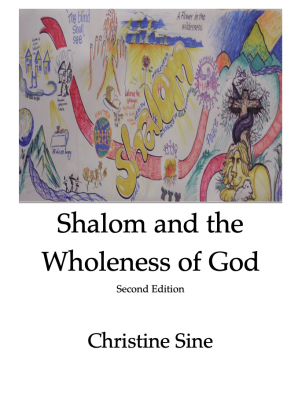 We all need the Wholeness of God…this resource includes reflections and activities for coping and thriving during challenges in search of shalom as well as hope for restoration.
We all need the Wholeness of God…this resource includes reflections and activities for coping and thriving during challenges in search of shalom as well as hope for restoration.
I am home from an amazing week in Baltimore, Maryland at the It’s All About Love: A Festival for the Jesus Movement. This was a revival gathering of the Episcopal Church and people who love the work and people of the Episcopal church like Presiding Bishop Michael Curry . If you aren’t Episcopal you might know him from the wedding of Prince Harry and Meghan Markle because he preached the wedding sermon and told the entire world that it’s ALL ABOUT LOVE or it isnt’t Christianity. The focus this festival gathering was threefold, three tents: Evangelism, Creation Care, and Racial Justice and Reconciliation. I was invited to create a Sacred Space prayer experience for the gathering under the Evangelism Tent and led a workshop on how to begin to host Sacred Spaces and make church. bit less boring by using Experiential Worship and teaching to all our learning styles not just to our ears.
A Sacred Space Prayer Experience is an interactive, multi sensory way to pray. If you know about Montessori School, this is like Montessori Church! It’s a station based way to pray. A prayer experience is a series of prayer stations created around a theme, sermon series or a scripture passage. A Sacred Space can be set up for a special event like a conference or a retreat, or it can be set up in a church or a coffee shop as an outreach event. Sacred Spaces are a great way to invite people to experience God who might not ever attend a regular worship gathering. Sacred Spaces are great inter-generational worship experiences too. Sacred Space is about participation! You actually do an action at each of the stations.
The theme for this Sacred Space came from reading the First Nations Version New Testament and thinking about Jesus’s invitation to us to Follow Him. Jesus invites each of us to join him on a journey, on a pilgrimage of love and justice. We are invited join him on the Road of Love.
Love is patient and kind. Love is never jealous. It does not brag or boast, It is not puffed up or big-headed. Love does not act in shameful ways, nor does it care only about itself.
It is not hot headed, nor does it keep track of wrongs done to it.
Love is not happy with lies and injustice, but truth makes its heart glad.Love keeps walking even when carrying a heavy load.
Love keeps trusting, never loses hope, and stands firm in hard times.
The road of love has no end. “
I Corinthians 13:4-8 First Nations Version
I loved this last verse: Love keeps walking even when carrying a heavy load.
Love keeps trusting, never loses hope, and stands firm in hard times.
The road of love has no end.
So I titled this Sacred Space ” The Road of Love…or Joining Jesus on the Road of Love”
You are invited
on the
Road of Love!
Jesus says
Follow Him on a Pilgrimage
of LOVE!
On a Pilgrimage,
we watch for the signs of God’s love for us.
We allow Jesus to surprise us with his love and unexpected gifts.
We allow Jesus to love us along the way and we are transformed in the journey.
On a Pilgrimage,
we watch for the signs of God’s love for us.
We allow Jesus to surprise us with unexpected gifts.
We allow Jesus to love us along the way and we are transformed in the journey.
Pilgrims take time to notice and pay attention.
They listen, watch for signs, and allow for interruptions.
We pilgrims follow closely and get the dust of the rabbi on us.
Consider the Road you are walking with Jesus right now. Is it smooth, rocky, covered with trash or gifts? Tell Jesus where you are. Maybe you need to give yourself permission to stop at a rest stop and take a break.
What gifts have your received on the Road with Jesus lately? Take time to say thank you to Jesus.
How has Jesus surprised you lately? Are you paying attention and watching for signs?
Consider who needs to walk with you and pray for them to join you and Jesus on the Road of Love.
This weekend take time to join Jesus on the Road of Love
Below is a video description of the On the Road Sacred Space. I love curating spaces and helping others learn to practice experiential worship. I’m creating a downloadable kit of this experience that will be available later this summer.
PRAY WITH ME :
Explorer God,
You have put within us
A spirit of adventure move beyond the immediate,
And to see
In the ordinary things
You extraordinary presence of love.
Propelled by your Spirit,
May each day become an adventure
Of people, tasks, places and responsibilities.
And when we feel grey and lifeless
May you remind us
That each day holds
It’s own gifts:
New truths,
Restored vision,
Inner healing, and the possibility
To forgive even our enemies. AMEN
Peter Millar (Iona Prayer Book)
LAST CALL! Join me THIS August 28-Sept. 4th. Finding Your Thinplace Retreat Pilgrimage.=IN SCOTLAND! 5 days on Iona!
by Carol Dixon
Happy International Friendship day!
What a lovely reason to think of all our friends across the globe today and remember them in our prayers.
I am blest living in the United Kingdom to be part of a group of 4 nations – England, Scotland, Wales and Ireland (more if you count in the Isle of Man and the Channel Islands which have their own parliaments). Most of the time the separate nations get along fine but at least the actual fighting, particularly between Scotland and England came to an end over 300 years ago with the Union of the Crowns – Northumberland often felt the brunt of the battles, being a border county ravaged by the English going north and the Scots marauding south.
I was fortunate to be brought up by an English mother and Scottish father so I learned the history and culture of both countries. My parents were very hospitable too and we often entertained visitors from different places and quite a few of our relatives emigrated to different continents – Canada and Australia mainly and it was really interesting to receive letters from them describing their new places of residence and the different customs. Their visits too were a fascinating insight into different cultures and at home we have quite a collection of knick -knacks from different countries given to us over the years by friends and relatives from across the world in our glass cabinet – France, Germany, Sweden, China, Malaysia, Borneo, the Holy Land, Pakistan, India, Jamaica, Lithuania to name a few – each one bringing back lovely memories of the stories attached to them.

Some of the knick-knacks from other countries given to us by friends
Since I was twelve I have corresponded with my Swedish penfriend – we’re now both grannies in our 70s and it’s via instant email these days, not letters which took 7 days to arrive. We were delighted to visit them in 1972 (when we made front page news in their local newspaper!) and, as well as some visits during the 1980s with our children, we last saw them in 2016 and enjoyed their family hospitality as well as some lovely days out together.
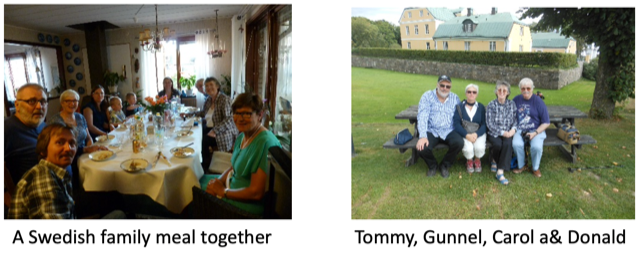
Over the years my husband, Donald and I have travelled, too – wonderful camping holidays in France with our children where we sampled different foods and saw interesting places quite different to ours. It was good to be able to speak a little of the language too (albeit school French) which allowed us to converse with our neighbour’s and chat in the village shop.
When Donald was at university as a mature student we hosted some of his fellow international students for Christmas. Most were the same age as our youngsters so they had people of their own age to converse with, not just us oldies. The Chinese Malaysian family became great friends of ours and we were invited to their weddings in Kuala Lumpur which gave us a wonderful opportunity to experience a totally different culture and faith (Buddhism).
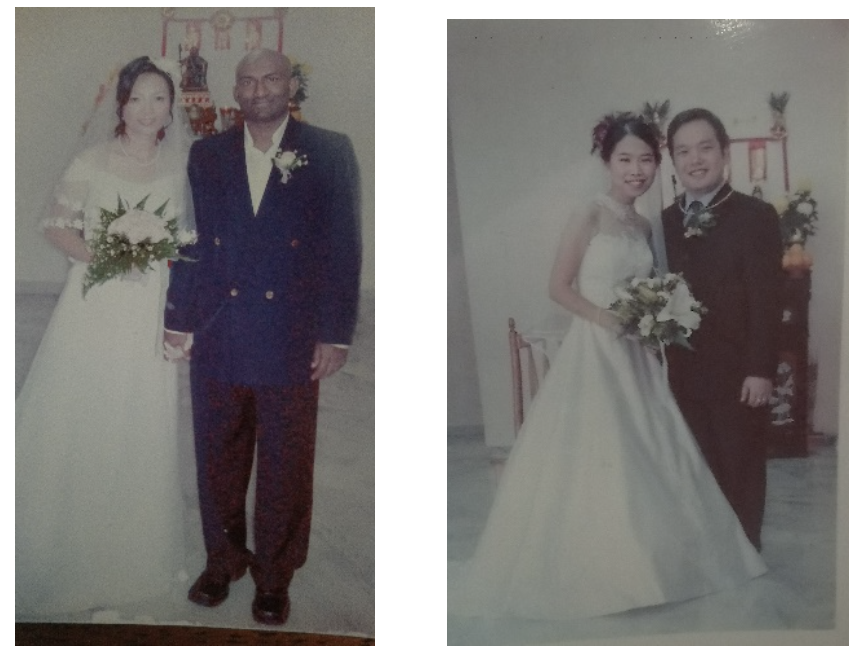 They called us ‘English parents’ and we were honoured to be invited to take part in the tea ceremony at the wedding where the newly married couple serve tea in their new teacups, normally reserved for close family members only. It was wonderful too when Donald was invited to read Paul’s hymn of love from I Corinthians 13 at a Buddhist wedding.
They called us ‘English parents’ and we were honoured to be invited to take part in the tea ceremony at the wedding where the newly married couple serve tea in their new teacups, normally reserved for close family members only. It was wonderful too when Donald was invited to read Paul’s hymn of love from I Corinthians 13 at a Buddhist wedding.
1 Corinthians 13:4-8 New Living Translation
4 Love is patient and kind. Love is not jealous or boastful or proud 5 or rude. It does not demand its own way. It is not irritable, and it keeps no record of being wronged. 6 It does not rejoice about injustice but rejoices whenever the truth wins out. 7 Love never gives up, never loses faith, is always hopeful, and endures through every circumstance.8 Love will last forever!
St Paul’s great statement about love is a wonderful example of international friendship too. If you intersperse the words ‘A true friend’ for ‘Love’ In St Paul’s letter it works wonderfully. eg
4 A true friend’ is patient and kind. A true friend’ is not jealous or boastful or proud 5 or rude. A true friend’ does not demand their own way. A true friend’ is not irritable and keeps no record of being wronged. 6 A true friend’ does not rejoice about injustice but rejoices whenever the truth wins out. 7 A true friend’ never gives up, never loses faith, is always hopeful, and endures through every circumstance.8 A true friend’ will last forever!
True friends are all these things whether they live next door or across the other side of the world and Jesus is the greatest friend of all. As he told his disciples at the last supper ‘12 My commandment is this: love one another, just as I love you. 13 The greatest love you can have for your friends is to give your life for them. 14 And you are my friends if you do what I command you. 15 I do not call you servants any longer, because servants do not know what their master is doing. Instead, I call you friends, because I have told you everything I heard from my Father.’ (John 15: 12-15). The song that encapsulates this for me is a beautiful hymn from Ghana ‘Kneels at the feet of his friends’.
So today perhaps you would like to give thanks for your friends at home and across the world and maybe let them know how much you appreciate their friendship. I shall start the ball rolling by saying a BIG THANK YOU to all my Godspacelight friends across the world. Thank you for your wonderful reflections which are so uplifting (& sometimes challenging). Thank you for your love and prayers during my times of ill health and your good wishes in times of joy. And above all thank you Christine for the opportunity to share our Christian faith with one another whatever our ethnicity, nationality, or denomination in love, respect and hope through Jesus our Lord.
Many blessings for International Friendship day 2023.
 Looking for hospitality inspiration? We have an entire resource page dedicated to hospitality. Find recipes and reflections on numerous hospitality topics, including Celtic hospitality, prayers, and liturgies. Click on Hospitality for more!
Looking for hospitality inspiration? We have an entire resource page dedicated to hospitality. Find recipes and reflections on numerous hospitality topics, including Celtic hospitality, prayers, and liturgies. Click on Hospitality for more!
by Laurie Kline
Her gaze froze me in place.
“Be a spokeswoman for peace,” author Susan Vreeland said.
Five words. Oh, how they sobered and thrilled me: a sacred charge.
Have I even begun to fulfill it? A little, perhaps. These days, with fewer years to grow into the calling, I want to live kindly, wholeheartedly—as St. Mildred did, in her tumultuous times.
Daughter of 8th century Anglo-Saxon king Merewald of Magonset, young princess Mildred braved the perilous journey by sea to France. The Abbess of the convent school there, in Chelles, had agreed to educate her.
At some point during training, a noble relation of the Abbess sought her permission to wed Princess Mildred. Did the Abbess imagine gold for her coffers? Consent was given.
“I was sent here to learn, not marry,” the girl meekly replied.
Despite threats and blows, gentle Mildred held her ground. The Abbess was not a woman of peace. Legend says that she threw her student into a blazing oven. For three hours.
Mildred stepped out, blinking perhaps, “unscathed and radiant.”
The Abbess went postal. Tradition tells us savage beatings followed.
Mildred endured.
Is this how a heart for peace takes root?
Reports of the abuse finally reached Mildred’s mother. The Anglo-Saxon Queen, by now an Abbess herself, sent ships to rescue her daughter. Escaping by night, Mildred carried home a sacred nail, reputedly from the cross.
Reunited at last, Mildred joined her mother at the island monastery, Minster-in-Thanet, where she became a nun. How surprised she would have been to learn she would become a revered saint, her feast day celebrated, worldwide, in July.
Eventually, Mildred succeeded her mother as Abbess, consecrated to her new calling by Theodore, the archbishop of Canterbury. For three decades, the former princess and bride of Christ ceaselessly served her community.
Legend claims that while Abbess Mildred prayed one night, the prince of darkness extinguished her candle.
An angel drove him away, then relit her taper.
Renowned and beloved as a peacemaker, Mildred died from a painful, lingering illness. In 1033, her remains were transferred to a shrine in St. Augustine’s Abbey, Canterbury, along with her precious collection of relics. Testimonies of miraculous healings surfaced, and her fame spread across England and Europe.
Paragon of gentleness, generous compassion, and serenity, St. Mildred was an advocate for widows and orphans, troubled people and social pariahs.
I like imagining a gravestone bearing her name, which means “peaceful counsel.”
Friends, what will we write or speak this day in the name of peace?
***
Author Juline W urges us to emulate Mildred’s example:
Through constant prayer and frequent fasting,
by ceaseless hymnody and great humility,
the glorious Mildred forsook
the allurements of her royal rank,
trampling underfoot all worldly pride
and presumption. Wherefore,
let us imitate her virtues,
that, free from all earthly attachments,
we may join her
at the wedding feast of Christ our Saviour.
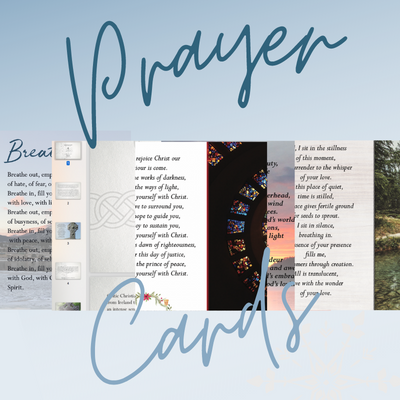 Prayer cards are available in the shop for many occasions and seasons–from everyday pauses and Lenten ruminations to breath meditations and Advent reflections, enjoy guided prayers and beautiful illustrations designed to delight and draw close. Many are available in single sets, sets of three, and to download–even bundled with other resources!
Prayer cards are available in the shop for many occasions and seasons–from everyday pauses and Lenten ruminations to breath meditations and Advent reflections, enjoy guided prayers and beautiful illustrations designed to delight and draw close. Many are available in single sets, sets of three, and to download–even bundled with other resources!
As an Amazon Associate, I receive a small amount for purchases made through appropriate links.
Thank you for supporting Godspace in this way.
When referencing or quoting Godspace Light, please be sure to include the Author (Christine Sine unless otherwise noted), the Title of the article or resource, the Source link where appropriate, and ©Godspacelight.com. Thank you!

